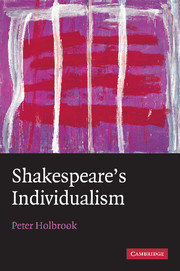Book contents
- Frontmatter
- Contents
- Acknowledgements
- Introduction
- PART I SHAKESPEARE, HAMLET, SELFHOOD
- 1 Hamlet and failure
- 2 ‘A room … at the back of the shop’
- 3 Egyptianism (our fascist future)
- 4 ‘Become who you are!’
- 5 Hamlet and self-love
- 6 ‘To thine own self be true’
- 7 Listening to ghosts
- 8 Shakespeare's self
- PART II SHAKESPEARE AND EVIL
- PART III SHAKESPEARE AND SELF-GOVERNMENT
- Conclusion: Shakespeare's ‘beauteous freedom’
- Index
- References
2 - ‘A room … at the back of the shop’
Published online by Cambridge University Press: 06 July 2010
- Frontmatter
- Contents
- Acknowledgements
- Introduction
- PART I SHAKESPEARE, HAMLET, SELFHOOD
- 1 Hamlet and failure
- 2 ‘A room … at the back of the shop’
- 3 Egyptianism (our fascist future)
- 4 ‘Become who you are!’
- 5 Hamlet and self-love
- 6 ‘To thine own self be true’
- 7 Listening to ghosts
- 8 Shakespeare's self
- PART II SHAKESPEARE AND EVIL
- PART III SHAKESPEARE AND SELF-GOVERNMENT
- Conclusion: Shakespeare's ‘beauteous freedom’
- Index
- References
Summary
Actually, it is the crime humans consider the greatest and which they punish most cruelly, that of not being like others. It is just this that proves them to be creatures of the animal kingdom. The sparrows rightly peck to death the sparrow which is not like the others, for here the species is higher than the specimens, that is, sparrows are animals, no more, no less. In respect of what characterizes the human, each is meant on the contrary not to be like the others, to have its peculiarity. Yet human beings forgive every crime except that of being what in their view is to be inhuman – namely to be a human being.
Kierkegaard, Papers and Journals, 311.Like Kierkegaard, Montaigne championed authenticity. And like Hamlet, he kept a part of himself in reserve. The ‘wise man’ might, for the sake of a quiet life, go along with ‘received forms and fashions’ – but he ‘should withdraw [his soul] from the crowd’ (133; I.23). In ‘On Solitude’ he wrote: ‘We should have wives, children, property and, above all, good health … if we can: but we should not become so attached to them that our happiness depends on them. We should set aside a room, just for ourselves, at the back of the shop, keeping it entirely free and establishing there our true liberty, our principal solitude and asylum’ (270; I.39). Hamlet's appeal lies in an aggressive singularity.
- Type
- Chapter
- Information
- Shakespeare's Individualism , pp. 51 - 55Publisher: Cambridge University PressPrint publication year: 2010



